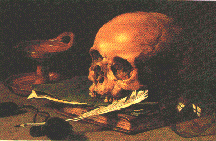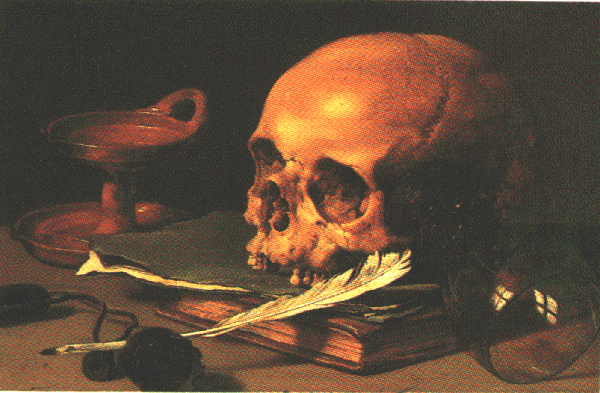



464.539 (Sec. 010 Homewood)
Wednesdays, 6:15-7:55 p.m.
401 Shaffer Hall
January 25-May 3, 1993
How do historians evaluate evidence and draw conclusions about the past? How persuasive is the thesis of Simon Schama's Dead Certainties that "the asking of questions and the relating of narratives need not ... be mutually exclusive forms of historical representation," and that history ultimately must be "a work of the imagination"? After probing these and other issues, and writing their own 'histories' based upon the document packets, students focus on Allen Weinstein's Perjury: The Hiss-Chambers Case to discuss whether historians can ever determine "the truth" no matter how rich the evidence. For the reference to the above graphic click here.
Simon Schama, Dead Certainties New York: Alfred A. Knopf, 1991,
"Captain Berry's Will, 1784" a document packet,
"Is Baltimore Burning?" a document packet on the meaning, legality, and consequences of rhetoric, 1964-1968,
Allen Weinstein, Perjury. The Hiss Chambers Case. New
York: Alfred A. Knopf, 1978.
A short (3-4 page) essay based upon the assigned reading is due the class following the last class in which the book or Document Packet is discussed. Critical essays on the two books should include your reactions to the arguments in the book and your reflections on how convincing the author is. For the first assignment, book reviews by other authors will be provided, but for the second book, students will be expected to seek out reviews at the library and to include in their essay any criticisms found to be relevant.
The essay for Dead Certaintieswill be due on Wednesday, March 1. *[Amendment to the syllabus: the essay
for Perjury, originally due on Wednesday, April 26, has been cancelled and students have been asked to concentrate their efforts on the final paper instead.] Essays based
upon the document packets are meant to be your own efforts at writing
what you conclude (from our reading and discussion of Schama) is the
most effect and persuasive manner in which history ought to
be written. Essays on the Document Packets are due as noted on the
schedule: Wednesday, March 15 for "Captain Berry's Will" and Wednesday,
April 5 for "Is Baltimore Burning?."
In addition, each member of the class will be expected to submit a final paper of no more than ten pages in length in which the Hiss case will be examined and argued from the perspective of one of the key players in the story (i.e. Alger Hiss (see: Recollections of a Life,1988), Donald Hiss, Whittaker Chambers (see Witness, 1952), Priscilla Hiss), or from the perspective of one of four contemporary observers, Earl William Allen Jowitt (The Strange Case of Alger Hiss,1953), Alistair Cooke (A Generation on Trial,1952), Meyer Zeligs (Friendship and Fratricide,1967), or John Chabot Smith (Alger Hiss: The True Story,1976). I also would be amenable to students assuming the perspective of any other person directly connected with the case if the choice is made and discussed before we end the discussion of Perjury. The final paper will be due the last night of class (Wednesday, May 3) which will be held at our home, 206 Oakdale Road, Baltimore, MD 21210. At that class you will be expected to present your conclusions orally and to engage in a spirited defense of your assumed point of view.
Each review essay will be worth up to twenty points each and the
final paper will be worth up to forty points. Bonus points will be
awarded for class participation (up to twenty points). Ten points
will be subtracted for each day an assignment is late.
A=90-100 points; B=80-89 points; C=70-79 points; D=60-69 points; F=
anything less than 60 points.
NOTE: The direct quoting of someone else's work (anything more than a phrase or two) without using quotation marks and citing the specific source of the quote (author, title, edition, and page) will not be tolerated and will result in an automatic 'F' on the assignment. Adopting an author's point of view is not considered plagiarism as long as the source is identified by some form of annotation of your text (i.e. footnotes, Turabian short form; note on sources at the end of your essay or review, or some other format approved in advance by the instructor).
ęDr. Edward C. Papenfuse (instructor)
State Archivist
Office Hours by appointment
Phone: (o) 410-974-3869; (h) 410-467-6137
Internet Address: edpapen@hotmail.com
Last update: 6 February 1999